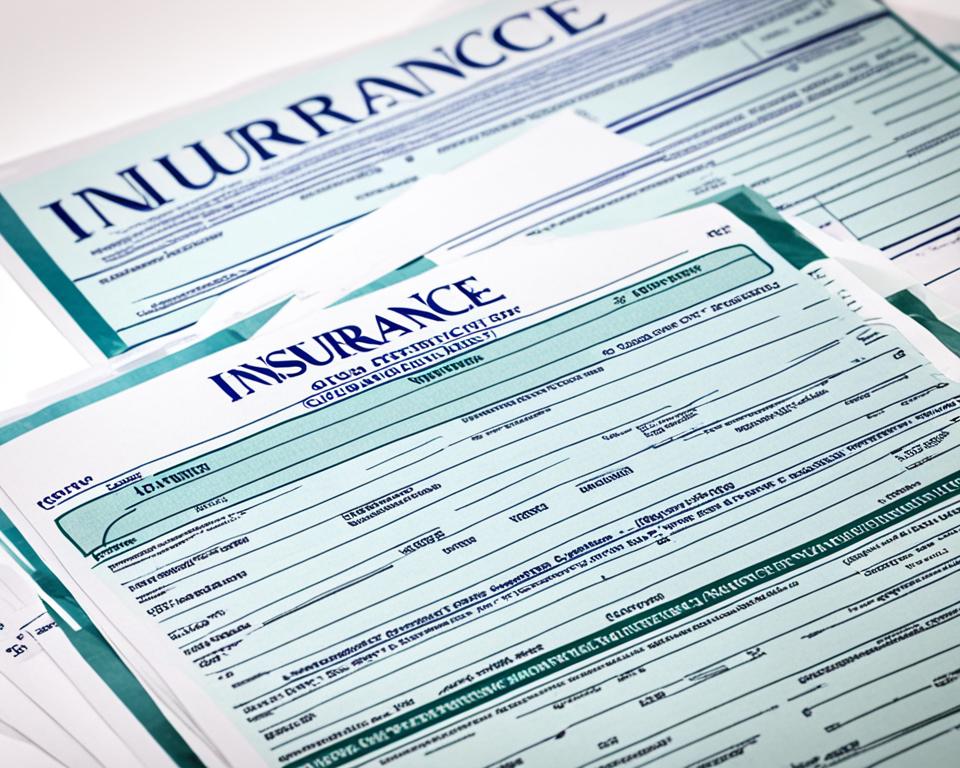Protecting your items is key. Property and casualty insurance gives top-notch coverage for your assets.1 This guide will explore top strategies. It aims to make your real estate safe from dangers. You’ll learn why asset protection matters. Plus, we’ll show you how to use the right business entities and insurance coverage. This article aims to give you the tips and tools you need to strengthen your investments and safeguard your future.
Key Takeaways
- Safeguarding your assets with tailored property and casualty insurance solutions
- Strategies and best practices to elevate your asset protection
- Navigating the world of business entities and insurance coverage
- Fortifying your investments and securing your financial future
- Understanding the importance of asset protection
The Fortress Mentality: Understanding Asset Protection
Real estate investing can be very rewarding but also risky. Lawsuits might come from tenant accidents or disagreements with builders. They could even come from creditors. These legal troubles might endanger the wealth you’ve built up. Learn how to protect your assets. It’s like building a fortress around your investments. This keeps them safe from troubles.
The Perils of Real Estate Investing
Asset protection means using legal methods to keep your assets safe from debts and lawsuits.2 Real estate, being physical property, is often a target. People may try to take a piece of what you own. But, protecting your assets is not about hiding wealth. It’s about arranging your affairs smartly. This lessens risks and helps your investments last longer.
Shielding Your Wealth: The Necessity of Asset Protection
To protect your assets, you need to be proactive. You should know about different legal methods. This includes forming business entities and using trusts. By understanding these tools, you can set up strong defenses. This protects your real estate wealth from harm.
Legal Strategies for Protecting Your Assets
In Texas, there are special laws to help residents protect their assets.2 For instance, homestead laws shield homes from certain debts. They also keep some wages safe from creditors. Texas exempts some properties, like cars and retirement savings, from being taken by creditors.2 Certain savings plans that are tax-exempt are also protected by federal laws.2 But, cash is usually not protected, making it a risky asset. Without protection, stocks and bonds can be taken. These laws show why it’s important to protect your assets. This includes keeping business property and personal property separate.2 Knowing these laws is key to keeping your wealth safe from creditors.
Building Blocks: Choosing the Right Business Entity
Your real estate empire starts with the right business structure. Choosing well is like finding solid grounds for your castle.3 Many real estate investors go for Limited Liability Companies (LLCs). They provide a flexible structure and protect your personal assets from business debts.4
Limited Liability Companies (LLCs): Flexible Fortresses
LLCs shield their owners from debts and offer tax benefits. Any money made or lost can reflect in the owners’ personal taxes.4 Setting up an LLC costs around $200 in New York, plus ongoing fees.4 This type of structure is especially useful for those in risky fields like law or healthcare. It helps keep personal assets safe from business debts.3
S Corporations: Strategic Battlements
S Corps handle profits and losses in a special way that avoids double taxing. Yet, they come with rules on shareholder numbers and types.3 Keeping an eye on these limits is key to keeping their benefits.
C Corporations: Impenetrable Keeps
C Corps create a strong barrier between personal and business assets. They are tough on debts and taxes but also complex to manage.4 For big real estate ventures, C Corps offer a solid protective wall. They are designed to face serious legal and financial challenges.
The Cornerstone: Asset Separation and Tax Implications
It’s vital to pick the right business structure. It affects how your assets are protected, your taxes, and your opportunities to grow.5
By using different entities for each property, you protect them. This way, your assets are safe even if one faces a problem.5 Knowing the tax perks of each type is key. It helps keep your investments effective for a long time.
| Business Entity | Asset Protection | Tax Implications | Ideal Scenarios |
|---|---|---|---|
| Limited Liability Company (LLC) | Flexible structure with strong liability protection | Pass-through taxation, avoiding double taxation | Small to medium-sized real estate investors |
| S Corporation | Separate legal entity with liability protection | Pass-through taxation, but with restrictions on shareholders | Smaller real estate empires with a limited number of investors |
| C Corporation | Strongest separation between personal and business assets | Potential for double taxation, but more flexibility in ownership structure | Large-scale real estate portfolios with multiple properties and investors |
Grasping how asset separation and taxes work in various business structures is crucial. It helps you set up your real estate plans for lasting success and growth.
This basic know-how allows you to protect your assets well and use tax benefits.

Insurance: The Secret Passageways of Your Fortress
Think of insurance as the hidden passages and secret rooms in your fortress. It adds another layer of shield for your belongings. Homeowners insurance is vital for keeping your main home safe. It makes sure your castle can weather any surprise challenges.
Homeowners Insurance: Fortifying Your Castle
Homeowners insurance acts as the base for fortifying your property kingdom.6 It covers your main house against many risks. This way, your castle is safe from harms like damage or big legal costs.
Liability Coverage: Protecting Against Invaders
Liability coverage is key in your insurance defense. It guards your wealth from claims, like if someone gets hurt on your property. Handling these risks makes your real estate safer and stronger.
Customized Coverage Options
Insurance companies also offer special plans.6 These can cover extra buildings, your stuff, or even rentals by the sea. Adding these options can better protect what matters most to you.
Property and Casualty Insurance: The Comprehensive Shield
Property and casualty insurance acts like a big umbrella for your real estate. It protects your homes and business spaces.7 This insurance guards against many dangers, like property harm or lawsuits, keeping your money-making properties safe.7
Protecting Your Residential Investments
For houses and apartments you own, this insurance is vital. It covers risks like fires, theft, and natural disasters.7 Such coverage helps in keeping your rental places profitable and secure, knowing your investment is safe.7
Covering Your Commercial Properties
If you have offices, shops, or factories, you need special insurance. It shields these places from various dangers and legal risks.7 With this protection, your business properties stay safe and continue to make money.7
8 The US Trade Commission notes a rise in Property and Casualty Insurance. This is because of big losses and harm from climate disasters.8 By getting this kind of insurance, your real estate, both homes and businesses, stay protected against many risks.7

Claims Processing: When the Siege Begins
Even the strongest real estate empires may get attacked by insurance claims sometimes.9 In these tough situations, how your insurance handles claims is key.9 They should be fast, understanding, and caring. This approach can protect your assets and make you stronger.
Efficient and Empathetic Claims Handling
Dealing with insurance claims is crucial for protecting what’s yours.9 Insurance companies check claims to see what’s covered. How they handle this decides how quickly you can get back on your feet after a loss.9 An approach that focuses on talking often, acting fast, and knowing what to do is very helpful.
The Elite Repair Program
Olympus Insurance has a special Elite Repair Program for top-notch claim handling. This program focuses on talking a lot, acting fast, and having the right skills. It ensures losses are managed well and your places get fixed quickly and correctly.9 Using this program can make the claims process smoother. It also reduces the impact on your real estate business.
Underwriting Guidelines: Fortifying Your Defenses
The underwriting process acts like your insurance fortress’s gatekeepers. They check the risks linked to your properties. Then they decide the right coverage and what you need to pay. Knowing how underwriting, risk checks, and risk lessening work lets you deal with possible weaknesses. This makes your real estate’s defense stronger.10
Risk Assessment and Mitigation
Insurers look closely at many things when they check your property’s risks. They think about where it is, what it’s made of, how safe it is, and how it’s taken care of. Knowing about these checks and doing things to lower risks, like better security or maintenance, can make your insurance better10. This also means you might get better payment terms.
Coastal Properties and Hurricane Preparedness
If your properties are by the coast, underwriters pay more attention to how ready you are for hurricanes. Tackling these specific issues helps make your places stronger against nature’s threats. This protects both your property and your finances11.
Using construction materials that stand up to hurricanes, having a good plan to leave if you need to, and getting the right insurance for coastal areas help a lot. With these steps, you have a better chance of getting good insurance terms. You also protect your properties from the worst effects of hurricanes and other natural disasters.

Premium Calculations: The Cost of Protection
Protecting your real estate empire costs money. It’s important to know what affects insurance premiums12. The size and value of your properties, coverage level, and risk profile matter13. Managing these factors can help get the best coverage for your money.
Factors Influencing Insurance Premiums
Premiums vary for each policy based on risk levels13. Insurers use data to predict future claims. This lets them set the right premiums for fire, water, and earthquake risks separately13.
For home insurance premiums, location and exposure to natural disasters are key13. The year built, materials used, and home systems also count. If it’s a vacation home or has roommates, that affects the price13. Age, claims history, credit score, and even dog breeds at home matter too13.
Balancing Coverage and Cost
Good insurance coverage is a must. But, keeping costs in check is also vital for your real estate investments’ health13. Choosing the right coverage and deductible is crucial for the final price. By assessing your needs and seeking expert advice, you can strike a balance between cost and quality13.

Policy Renewals: Maintaining Your Defenses
Keeping your insurance strong takes work and regular checks.14 As your property business grows and new risks come up, looking over your policies is key. This keeps your coverage right for what you need now.14 It’s smart to stay on top of this so you’re ready for anything that might come your way.
Periodic Reviews and Adjustments
The insurance policy renewals process is crucial for protecting your assets.14 Doing regular policy reviews is a chance to make sure you have the right coverage. It lets you see if any changes are needed to keep up with the latest rules and ideas.14
Actively looking over your policy renewals lets you adjust your cover as needed. This could mean updating limits or adding new protections as your property business changes.14 Keeping an eye on this helps make sure your assets stay safe, no matter what’s happening in the market.
Staying Ahead of Changing Landscapes
The world of real estate and insurance is always changing, offering new chances and risks.15 By keeping up with the latest in laws, trends, and best practices, you can tweak your insurance. This makes sure your protection is always strong, even against new threats.
Being ready for changes in the environment, markets, or laws is crucial. How you adapt and protect your assets against these shifts will determine your long-term success.

| Coverage Type | Key Features |
|---|---|
| Commercial General Liability (CGL) | Covers lawsuits seeking damages for bodily injury, property damage, advertising injury, and personal injury.15 |
| Excess/Umbrella | Provides additional limits when primary insurance is exhausted and may offer broader coverage that fills in gaps not covered by primary insurance.15 |
| Director and Officers (D&O) | Covers claims alleging that individual insureds committed wrongful acts in their capacity as directors and officers.15 |
| Employment Practices Liability Insurance (EPLI) | Covers claims alleging wrongful employment practices such as discrimination, retaliatory discharge, sexual harassment, etc.15 |
| Professional Liability (E&O) | Covers claims alleging that the insured was negligent in providing professional services.15 |
Conclusion: Securing Your Real Estate Empire
In the world of real estate, protecting your assets is like guarding your castles. You want to keep out anything that could harm your properties.16 This means using the right types of companies, insurance, and understanding how insurance works. Doing this makes your properties safer for the future.16
Think of your real estate like a strong castle. By using what you’ve learned here, you’ll make sure your empire lasts through time.16 With city housing prices going up,17 and few making high incomes,17 having a smart strategy for asset protection is key. It’s vital for your long-term investment safety.17
You can make your real estate invincible by carefully choosing your business types and insurance. This protects your investments no matter what the economy does.16 Nowadays, ways like real estate crowdsourcing offer great returns,17 and mortgages are very affordable.17 It’s a great time to make your investments secure for the long run.17
FAQ
What is the importance of asset protection for real estate investors?
What are the key legal strategies for protecting real estate assets?
How do different business entity structures impact asset protection?
What role does insurance play in asset protection for real estate investors?
How can real estate investors optimize their insurance coverage and premiums?
How can real estate investors stay ahead of changing landscapes in asset protection?
Source Links
- https://agent.travelers.com/mn/willmar/776-north-creek-dr
- https://lonestarlandlaw.com/asset-protection-in-texas/
- https://www.westfieldinsurance.com/insurance/business-insurance/business-insights/the-pros-and-cons-of-each-business-structure
- https://www.businessnewsdaily.com/8163-choose-legal-business-structure.html
- https://www.cornerstone-financial.com/tools/glossary
- https://universalproperty.com/docs/homeowners_endorsements.pdf
- https://alkemeins.com/understanding-the-basics-of-property-and-casualty-insurance/
- https://insboss.net/blogs/property-casualty-insurance-guide/
- https://www.investopedia.com/terms/i/insurance_claim.asp
- https://www.christensengroup.com/article/a-complete-guide-to-cyber-insurance
- https://content.naic.org/sites/default/files/national_meeting/Materials_C-Cmte.pdf
- https://www.investopedia.com/ask/answers/09/calculating-premium.asp
- https://www.squareone.ca/resource-centres/insurance-basics/understanding-your-insurance-premiums
- https://www.doi.sc.gov/957/Understanding-Your-Insurance-Policy
- https://www.jdsupra.com/legalnews/best-practices-for-protecting-your-37674/
- https://realestatefinancialplanner.com/asset-protection/
- https://www.financialsamurai.com/why-i-wanted-to-build-a-real-estate-empire/
